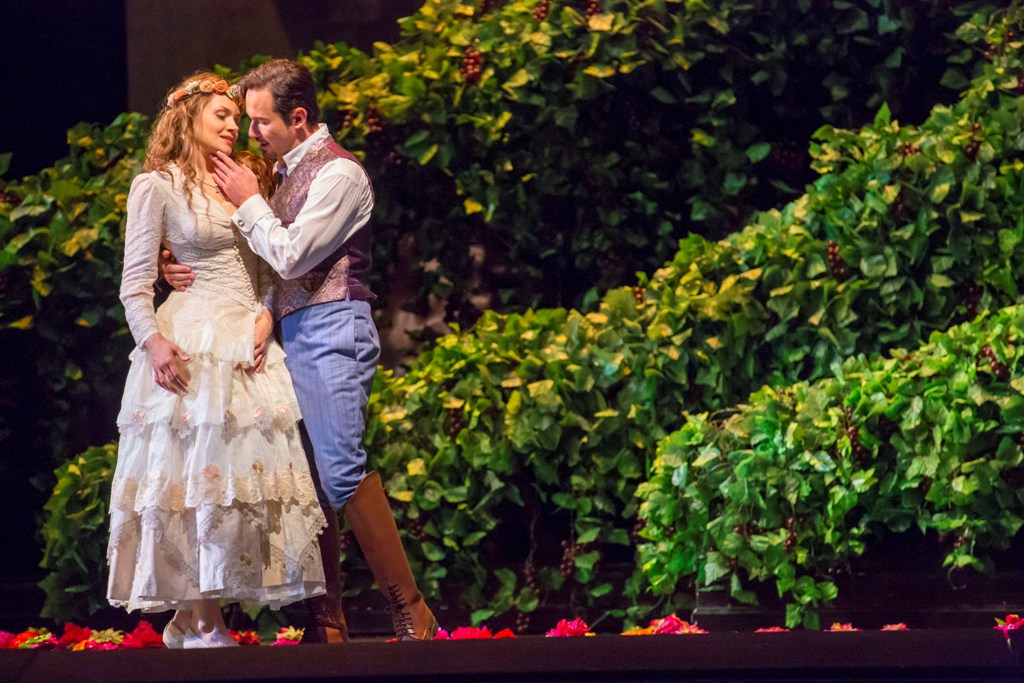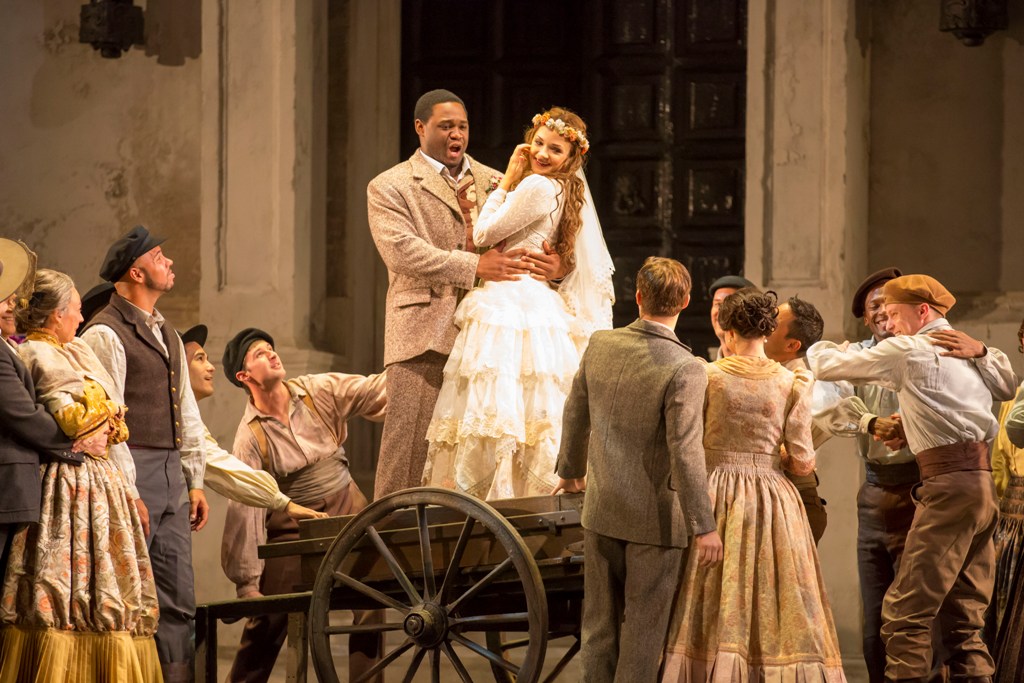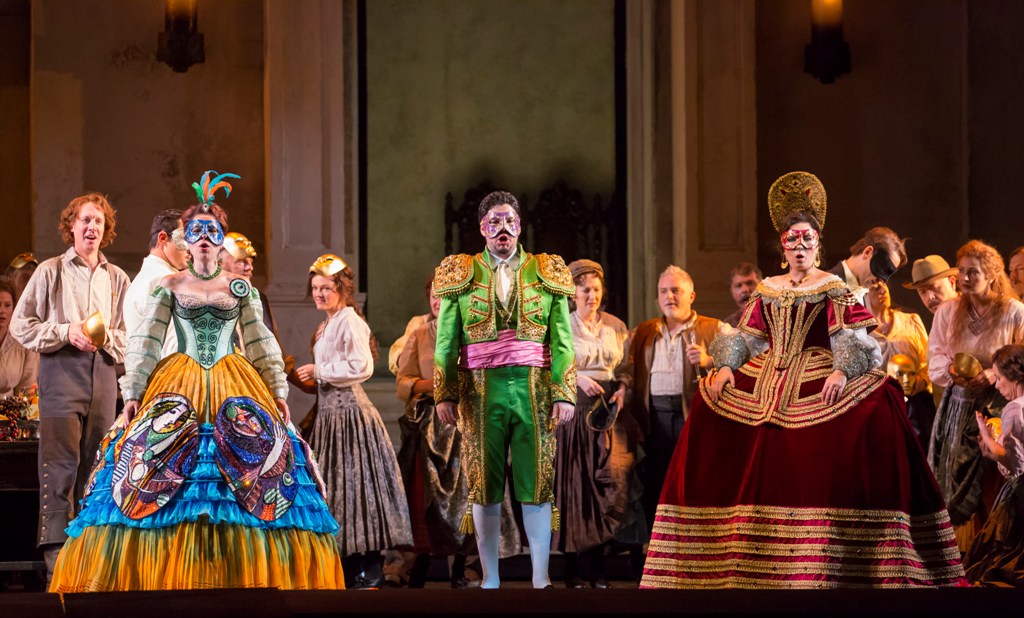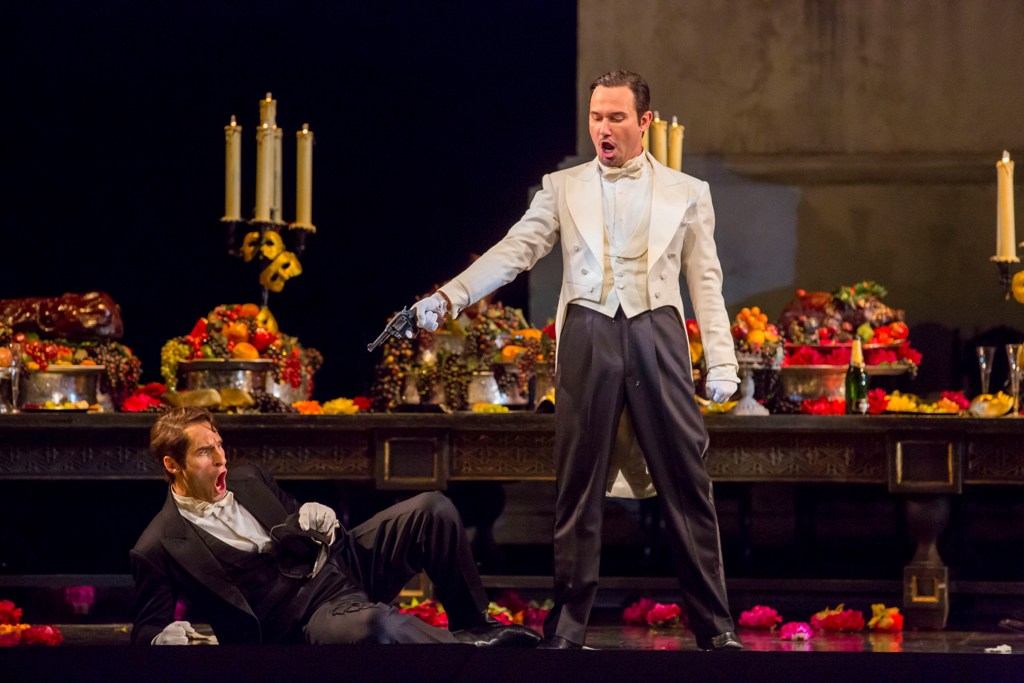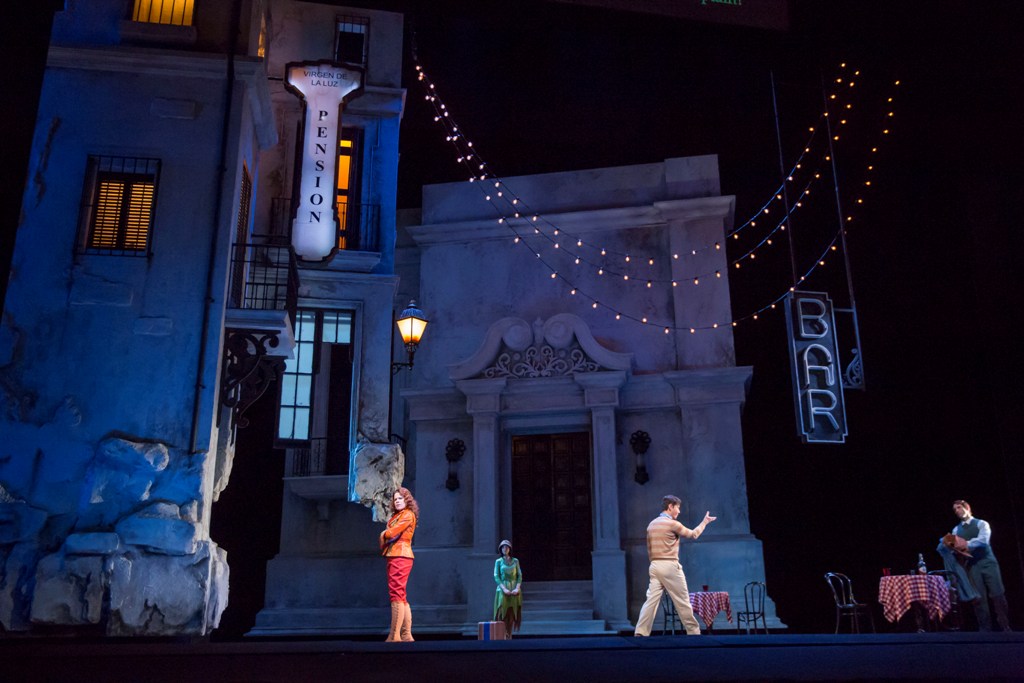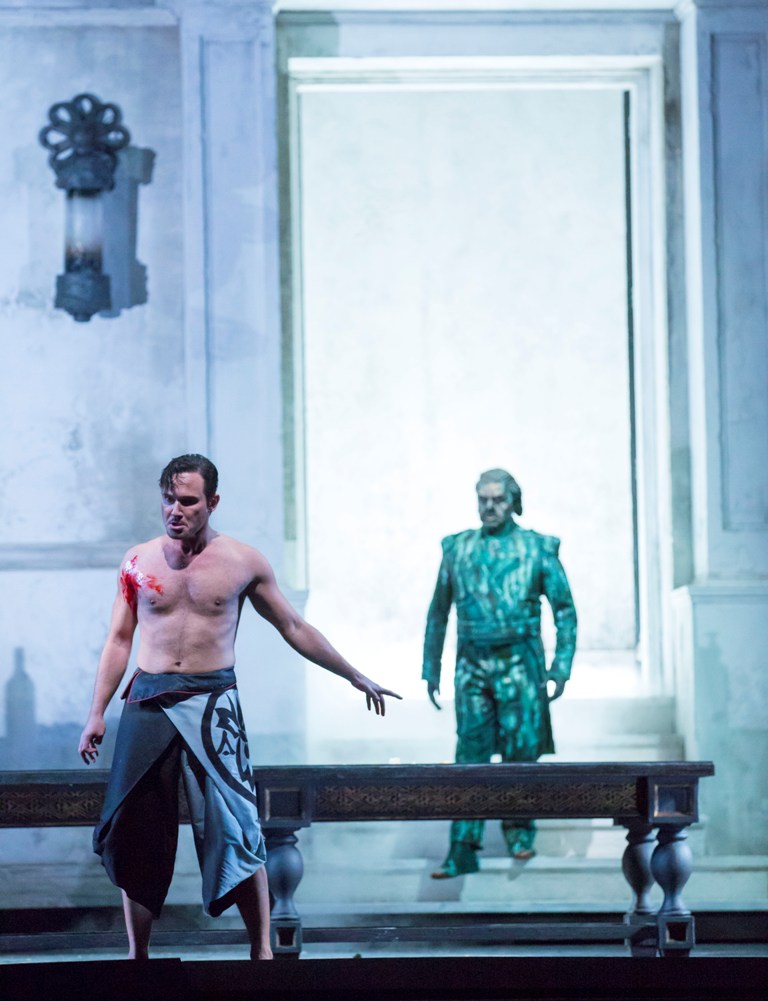Lyric Opera's Don Giovanni is one hell of a great show
/October 24, 2014 By Truman C. Wang
All photos by Todd Rosenberg, courtesy of Lyric Opera of Chicago
The dual nature of Mozart’s music, if not his character, has often been noted in the scholarly surveys by such writers as Edward J. Dent, Alfred Einstein, Joseph Kerman, et al. More recently, we saw in the film “Amadeus” (1984) how Mozart produces his most sublime works in spite of, or perhaps because of, his goofy streaks. Although much of the beloved film is fictionalized, it nonetheless offers a true glimpse of Mozart as a real person before he was to become this larger-than-life child of God as romanticized by the Nineteenth Century.
At the Lyric Opera of Chicago, much of the success of the new Don Giovanni production is due to director Robert Falls’ acknowledgment of this dual comic/serious aspects of Mozart (or buffa/seria in the correct historical terms), telling a serious story of the Don Juan legend while keeping the audience amused and entertained. By moving the settings to 1920’s Spain and dialing up the sex appeal, we have a bawdy dark comedy that entirely suits Mozart’s character as well as modern consumption (although I am not sure about the large contingent of school kids in the audience and their chaperons). In Act One, Donna Elvira vents in her aria “Ah chi mi dice mai”, lamenting Don’s betrayal, and buys herself a shot glass at The Bar. In Masetto’s ‘revolutionary’ aria “Ho capito, Signor, si”, the peasant accuses the aristocrat Don of trying to seduce his bride-to-be and the scene ends with a crashing fruit cart and bystanders scampering away as if frightened by his audacity to challenge authority. In the famous ‘vino’ aria, Don is seen fondling two girls like they’re his play dolls. Last but not least, in the Act Two banquet scene, Don amuses himself by throwing food across the room at Elvira while she makes her final plead with him. In the final analysis, director Falls packs enough action into each aria and scene that serves one of several purposes – heightens the drama, highlights the comedic buffa element, or illuminates a character. In the case of the extended ensembles in each Act finale, all three combine to achieve electrifying and entertaining results. One will not soon forget the mise-en-scène of Don being cornered by his six accusers in the Act One finale, or his dramatic descend into hell amidst flashes of bright light and billowing smoke.
Much of the hilarity of this production can also be attributed to the fast-and-loose English translation of Da Ponte’s Italian verses – Leporello describes his boss Don thusly to Elvira, “It’s like this, if it has 4 corners, it cannot be round”, and after Don’s fiery demise, “I am going to The Bar to find a new boss”, plus many instances of Leporello’s scenes with other characters. Director Falls took a buffa character from the Italian Commedia dell’arte tradition and anted it up to the Nth degree, reaping great dividends as a result. It’s a pity that this production, with its ‘buffa’ emphasis, does not include the very funny duet “Per queste due manine” for Leporello and Zerlina (written for the Vienna premiere in May of 1788).
One can talk about a great production all day long, but in the end, opera is nothing without great voices. Fortunately, this Lyric production has them in spades. Baritone Mariusz Kwiecien, whom I had heard in Seattle Opera’s “I Puritani”, continued to impress in the eponymous role, singing with smooth noble lines and acting with great bravado as Don Giovanni. On listening to his dulcet tones in the serenade “Deh vieni alla finestra” and in the Trio “Ah taci, inguisto core”, it’s not hard to see why women willingly fall under Don’s spell. Apart from his nobility of utterance, Kwiecien’s Don carried slightly raspy tones that betrayed the rakish character of a womanizing aristocrat, and his daring physicality in the ensembles made him a darling of stage directors.
As Don’s wisecracking sidekick, Leporello, a direct descendent of the Commedia dell’arte’s Harlequin, is the butt of most jokes and frequently played for a buffoon. Not here. Bass-baritone Kyle Ketelsen’s Leporello was highly musical with attention to the note values and did not bark out the words. Moreover, his deadpan delivery of the aforementioned one-liners was the mark of a real comedian.
As Don’s international conquests, sopranos Marina Rebeka (Donna Anna, Latvian), Ana Maria Martinez (Donna Elvira, Puerto Rican), and Andriana Chuchman (Zerlina, Canadian) all showed various vocal strengths for their prospective roles. Mozart had written the role of Anna for his sister-in-law Aloysia Lange, who was quite an accomplished singer with clarion high notes and spitfire agility. Anna’s grand aria and scena, “Non mi dir”, held no terror for Ms. Rebeka, who sailed through its stormy waters with heartfelt pathos and steely vocals. Ms. Martinez, a voice more lyric than dramatic, played a scorned woman on a mission to get her man back, and showed a fine range of Elvira’s emotions in her arias and ensembles, notably in the showstopper “Mi tradi” (“he betrayed me, but I still love him”). Ms. Chuchman’s sweet light soprano lent a great deal of charm to Zerlina’s two arias as well as the famous seduction duet with Don, “La ci darem la mano”.
Italian bass Andrea Silvestrelli sang with booming authority as the murdered Commendatore, father of Donna Anna, who comes back from the Great Beyond as a green giant statue to have ‘dinner’ with Don. Bass-baritone Michael Sumuel gave a rousing account of Masetto’s aria “Ho capito” but otherwise played second fiddle to his bride-to-be Zerlina. As Anna’s on-again, off-again betrothed, Don Ottavio, a light tenor role, is not exactly hero material despite all the heroics that he sings of. Nonetheless, Italian tenor Antonio Poli gave his best shot and it was pure vocal nirvana in the finest Italian bel canto tradition. It would not be an exaggeration for me to say that, in Ottavio’s two arias – “Dalla sua pace” and “Il mio tesoro” – Mr. Poli was channeling the ghosts of the great Italian tenors of the past such as Tito Schipa, Carlo Bergonzi, even Luciano Pavarotti.
The entire cast were clad in gorgeous costumes by Ana Kuzmanic. Particularly memorable were the resplendent ball gowns, inspired by Picasso, for Anna and Elvira for the Act One party scene. Walt Spangler’s handsome period sets of 1920’s Spain offer a plethora of props (bicycles, tables, a street vendor’s cart, balcony cloth lines, a vintage radio, etc.) for the characters and the stage director to play with and spice up the scenes.
Sir Andrew Davis was the conductor. He achieved the near-impossible task of maintaining rapport with the singers while keeping things tidy in the pit in this most symphonic of Mozart’s operas. He was fully in control of the many sound worlds of Don Giovanni – the D-minor supernatural world of the stone statue, the D-major world of the comic opera buffa, the full range of human emotions – all interwoven together into a rich, dramatic tapestry of sounds. Kudos for the Lyric Opera’s new Don Giovanni, a musical and theatrical tour de force that will be talked about for years to come.
Truman C. Wang is editor-in-chief of Classical Voice. Since 2003, his articles have appeared in the San Gabriel Valley Tribune, Pasadena Star-News, and other Southern California publications, as well as the Hawaiian Chinese Daily.

